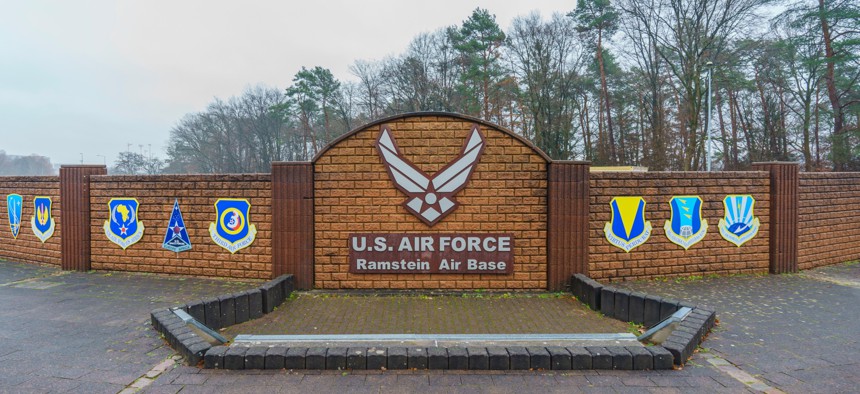
AFGE has signed on 389 non-appropriated fund employees at Ramstein Air Base in Germany as part of a new labor campaign. picture alliance / Getty Images
Workers at German military installation unionize amid AFGE's overseas push
Nearly 400 employees of a community center on Ramstein Air Base voted to form the American Federation of Government Employee’s second union local in Europe.
The nation’s largest federal employee union on Friday announced that nearly 400 employees at Ramstein Air Base in Germany had voted to join the American Federation of Government Employees, sparking what labor officials hope will be a flurry of unionization drives of federal workers stationed overseas.
The 389 non-appropriated fund employees all work for the Army and Air Force Exchange Service, which staffs stores, gas stations, restaurants and non-teaching positions at schools on military bases, at the Kaiserslautern Military Community Center. The workers will automatically be covered under an existing union contract between the agency and AFGE.
“We are excited to welcome this new group of employees to the AFGE family,” said Ottis Johnson Jr., national vice president of AFGE District 14, which oversees the new local, in a statement. “By voting to join AFGE, these workers will be in a better position to fight for improvements at the worksite by leveraging the bargaining power of 750,000 federal and D.C. government employees.”
Although AFGE once included an array of overseas locals dating back to the days when federal sector labor policy was governed by the Civil Service Commission, most fell into disuse upon the Pentagon’s adoption of rotating employees’ assignments every two years, a practice which itself has become relatively rare in recent years. Prior to this month’s election, the only active AFGE local in Europe—AFGE Local 3712—represents Naval Support Activity and Naval Exchange workers in Naples and Sigonella, Italy.
The election in Germany marks the first successful unionization drive since AFGE announced last spring that it plans to increase its footprint overseas. AFGE union organizer Peter Winch told Government Executive that the initiative has been driven in part by federal workers eager to improve working conditions.
“They really did come to us,” Winch said. “We had members who rotated to Europe and then they didn’t like what they saw: a lot of poor supervision, and the supervisors there have a lot of power, because they can extend you—theoretically, you rotate every two years, but you can get extended almost indefinitely—so you want to be on their good side . . . They talk about supervisors who are either military or [German], and at AAFES they tend to get part-time work when full-time hours are available, and instead local [German] nationals get the work. So they just want a little weight in the system on the other side of that.”
Additionally, Winch said the union has been able to identify areas to focus their organization campaigns thanks to the Biden administration’s collaborative approach to labor-management relations, particularly the Office of Personnel Management’s addition of bargaining status data to its federal workforce database, FedScope.
“If you look in there, there’s at least 20,000 eligible DOD employees, almost none of whom have a union,” he said. “Teachers are unionized, and there are a couple other exceptions but they’re really small. For the most part, they’re unrepresented and many times wanting a union, and we want to fulfill that interest.”
For the time being, the overseas unionization drive will follow a model AFGE used to organize bargaining units at the Transportation Security Administration once then-President Obama granted them abridged collective bargaining rights.
Local 14 is considered an “at-large” organization that will house new European-based bargaining units, and federal workers in workplaces that have yet to hold an election can join and pay dues through AFGE’s “eDues” program until their bargaining unit is recognized and the union can negotiate for automatic payroll deductions.
AFGE is also eyeing potential bargaining units within the Defense Health Agency and Defense Logistics Agency, both in Europe and other international regions. The union is in the midst of a campaign to represent DHA workers in Asia and the Pacific Islands, with an election slated for employees to choose between AFGE and the International Association of Machinists and Aerospace Workers.







